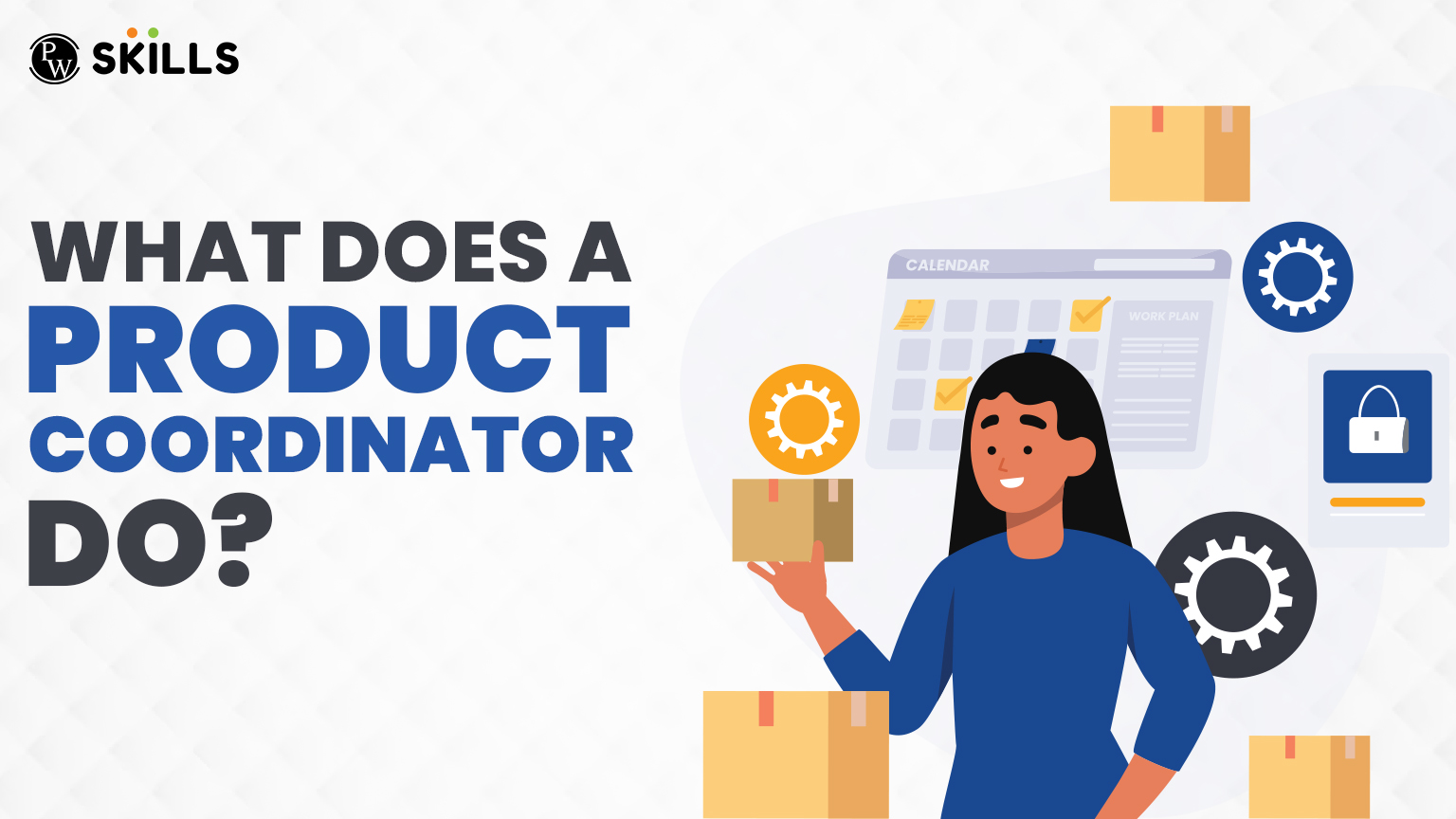Product coordinators turn product concepts into reality. When manufacturing and promoting a product, planned strategies are usually effective. Product coordinators watch a product’s roadmap and identify blockages, plan for difficulties, and design a strategy for prospective changes.
These responsibilities require specialised skills, knowledge, and vision to estimate what a production plan would require, depending on parameters ranging from consumer demand to cost. Learn about the role of a product coordinator and the skills required for success, as well as how to become one.
What is a Product Coordinator?
A product coordinator is a specialist who assists the product team by coordinating several areas of the product development process.
In a SaaS background, the position often entails managing cross-functional teams and ensuring that product features are delivered on schedule.
What does a Product Coordinator do?
The product coordinator serves as a link between the development, marketing, and sales departments, ensuring that the product satisfies both market demands and business goals. Other important responsibilities include monitoring product documentation, tracking progress, and organising timelines for the project.
Roles of a product administrator
Here are the main duties of a product lifecycle coordinator:
Managing the Product Life Cycle
A PC monitors each stage of a product’s life cycle to ensure that each procedure, such as product releases, runs on schedule. They assist in developing product planning, assessing performance, and optimizing these processes to enhance manufacturing efficiency and success.
Working with cross-functional teams
PCs provide straightforward communication and collaboration by connecting activities and information across departments. They work with design, engineering, and marketing teams to assist with product creation and management.
Analysing markets and identifying trends
A computer performs extensive research to discover market trends and prospective possibilities. It assists them in developing product plans that fulfil the demands of customers while remaining competitive.
Assessing customer needs
Product managers collect and evaluate customer input to better understand preferences and expectations. It allows them to develop and improve goods to increase customer happiness and product returns.
Coordinating quality assurance
PCs verify that goods satisfy business and industry standards and collaborate with teams to identify and address problems. Their attentiveness contributes to a company’s reputation for producing high-quality items and adhering to legal quality regulations.
Managing budgets
Product administrators create and oversee budgets for product development initiatives. They provide effective resource allocation to ensure that projects are completed within the company’s financial limit.
Managing vendors and suppliers
Procurement and purchasing officials use PCs to create and manage connections with vendors and suppliers, negotiate contracts, and ensure the timely delivery of critical supplies and services. Supplier management contributes to the smooth operation of products throughout their life cycles.
Providing product training and support
A PC trains and supports sales and customer service teams to assist them in obtaining and retaining knowledge and resources for promoting and supporting goods. It helps to promote revenue and client satisfaction.
Analysing competitors
Product managers keep an eye on rival products, evaluating strengths and flaws to help guide the company’s product development strategy. Understanding the competitive climate enables a PC to assist a firm in staying ahead.
Planning promotions
A PC works with marketing teams to create and execute product promotion initiatives. They verify that marketing materials and campaigns correspond to product characteristics, advantages, and target consumers.
Inventory management
PCs monitor inventory levels and collaborate with production and logistics departments to ensure acceptable stock levels. It assists in balancing supply levels to match demand while reducing costs and increasing customer satisfaction.
Product performance tracking
A PC monitors and evaluates product performance data to discover areas for improvement or growth. This data-driven approach informs future product selections and tactics.
Regulatory compliance
Product administrators verify that goods comply with applicable industry norms and standards in order to control legal and safety hazards. They keep up with regulatory developments to ensure that the firm remains compliant and protects its brand.
Duties and responsibilities of a product coordinator
Product coordinators must forecast the demands of a product’s beginning and implement using market research, prices, industry trends, and other factors.
In this capacity, you may play an important part in ensuring that a product matches your firm’s brand, fits the demands of the target market, and is profitable for the organisation. Find out other possible responsibilities:
- Analyse product costs and generate quotations based on research. Evaluate product design and offer improvements based on market research, competition, and trends.
- Determine the optimum method of distribution for a product and manage the full product launch process, including sample distribution.
- Using project tracking software, create and monitor production timetables, and communicate project deadlines to all stakeholders involved.
- Ensure that the product development process adheres to the project budget and make modifications as needed.
- Pricing estimates, purchase orders, invoices, and vendor/supplier contracts should all be organised and filed for production purposes.
- Create quality assurance checkpoints and alerts along the manufacturing schedule, and communicate quality problems to management.
Skills of a Product Coordinator
Product development and management jobs include managing both things and people. The whole life cycle of a product involves several points with individuals of various specialities.
Product coordinators must understand how to successfully interact with all stakeholders involved in the development and launch of a product, as well as construct a plan for developing and launching a product with an established support system.
Workplace skills
Workplace skills are important because product coordinators interact with so many diverse individuals during the product development process, empathy, compassion, and collaboration are critical personal traits. A collaboration mindset and a positive attitude will assist product coordinators in motivating staff and keeping everyone focused on a single objective. Product coordinators must also be adept at time management and multitasking.
Technical skills
Product coordinators must be familiar with the whole product lifecycle. Product coordinators are production management professionals who will most likely require technical capabilities such as market research, data analysis, A/B testing, software development, prototyping, and database administration. To guarantee that results meet customer expectations, you will most likely need to Use Agile methodology and product management tools in this capacity.
Working conditions and work environment
Product coordinators operate in various types of environment, although they often work for manufacturers, distributors, or related firms. Product coordinators often work inside an office environment. Travel may be required for product advertising, especially with consumers or media sources.
How to become a product coordinator
To become a product coordinator, you must first complete the education requirements and then look for methods to differentiate yourself through specialisations, certificates, or online courses that demonstrate understanding of vital product coordinator abilities.
Experience in business, management, or similar sectors can boost your job prospects at larger firms and help you achieve your long-term professional objectives. Explore these qualifications further:
Earn a bachelor’s degree
A formal degree is not necessary in certain circumstances, however, it is strongly recommended if you intend to work in this field for a long time or rise to a management position such as product manager.
Many product coordinators have degrees in business administration, finance, or other industry-related professions. For example, if you coordinate products in the computer science business, a bachelor’s degree in computer science could be desired.
Consider enrolling in specialised courses
Because the educational requirements for this career differ, many potential product coordinators take specialist courses to obtain the relevant skills. While no professional certificates are specifically established for product coordinators, project managers do have several certifications. Product coordinators can get certified in software systems, product management approaches, or other related professional skills.
- The Project Management Institute (PMI) provides multiple levels of Agile certification suitable for product coordinators, including Disciplined Agile Scrum Master, PMI Certified Agile Practitioner, and Disciplined Value Stream Agile Consultant.
- Many certificate programs on Coursera specialise in specific project management tools and approaches that a product coordinator is likely to utilise, such as Agile Project Management, Google Project Management, and the DevOps, Cloud, and Agile Foundations Specialisation.
- Through the Agile Project Manager (AgilePM) certification, APMG International provides training in Agile methodologies and methods for managing an Agile project’s lifecycle.
Gain experience
Many product coordinators begin their careers as entry-level sales associates, customer service representatives, or administrative assistants. The purpose is to get experience that will allow product coordinators to improve their everyday skills.
Research skills and certifications, as well as earning professional experience, are relevant to the demands of organisations looking for product coordinators. Another typical path for future coordinators is to begin in sales and marketing, as the majority of their activities include market research, cost analysis, and product introductions that align with a brand message.
Apply for jobs
When you are confident in your skills as a possible product coordinator, it is time to look for opportunities and begin the application process. To discover the applicant, many organisations are using Applicant Tracking System (ATS) software. You may be successful in publishing your CV to online job boards or professional social networks such as LinkedIn. Make sure your resume includes keywords that are relevant to the position you’re looking for.
Prepare your product coordinator resume by including your vital product coordinator abilities, associated accomplishments (certifications, awards, etc.), relevant experience, and education. List your relevant experience first, and utilise action verbs throughout your CV to demonstrate your accomplishments.
Also Read:-
- What Is a Product Owner, and How Do I Become One
- Competitive Product: Definition + How to Analyze One
- The Ultimate Guide to Agile Product Management
- Product Planning: What to Do, with Whom, and When
Product Management Courses With AI for Beginners
Using PW Skills, you will be able to successfully manage difficult projects and develop a successful career in product management. Through the PW Skills Product Management Course, you will be able to become a qualified professional in the field of product management. Using generative AI, you may increase your productivity by 10 times and prepare for high-level management positions.
Admission Closing Soon Click on Product Management Course and Enroll Now
Product Coordinator FAQs
Q1 - What is the role of a product coordinator?
Ans - A product coordinator helps to manage and organize the many duties associated with product development. Their duties include scheduling, documenting, and organizing team communication.
Q2 - What is the difference between a product manager and a product coordinator?
Ans - A product manager is in charge of the strategic elements of product development, such as vision, roadmaps, and feature prioritization. A product coordinator, on the other hand, is in charge of more operational activities such as scheduling and maintaining effective team communication.
Q3 - Is a product coordinator a good role?
Ans - Yes, it's an excellent starting place for anyone interested in product management. It provides fundamental experience in project management and team communication, which is essential for advancement in the field.
Q4 - What job level is a product coordinator?
Ans - A product coordinator is often an entry-level to mid-level employment that serves as a fundamental function for anyone wishing to gain expertise and advance in the product management field.


